The inquest begins into Wales' woeful World Cup
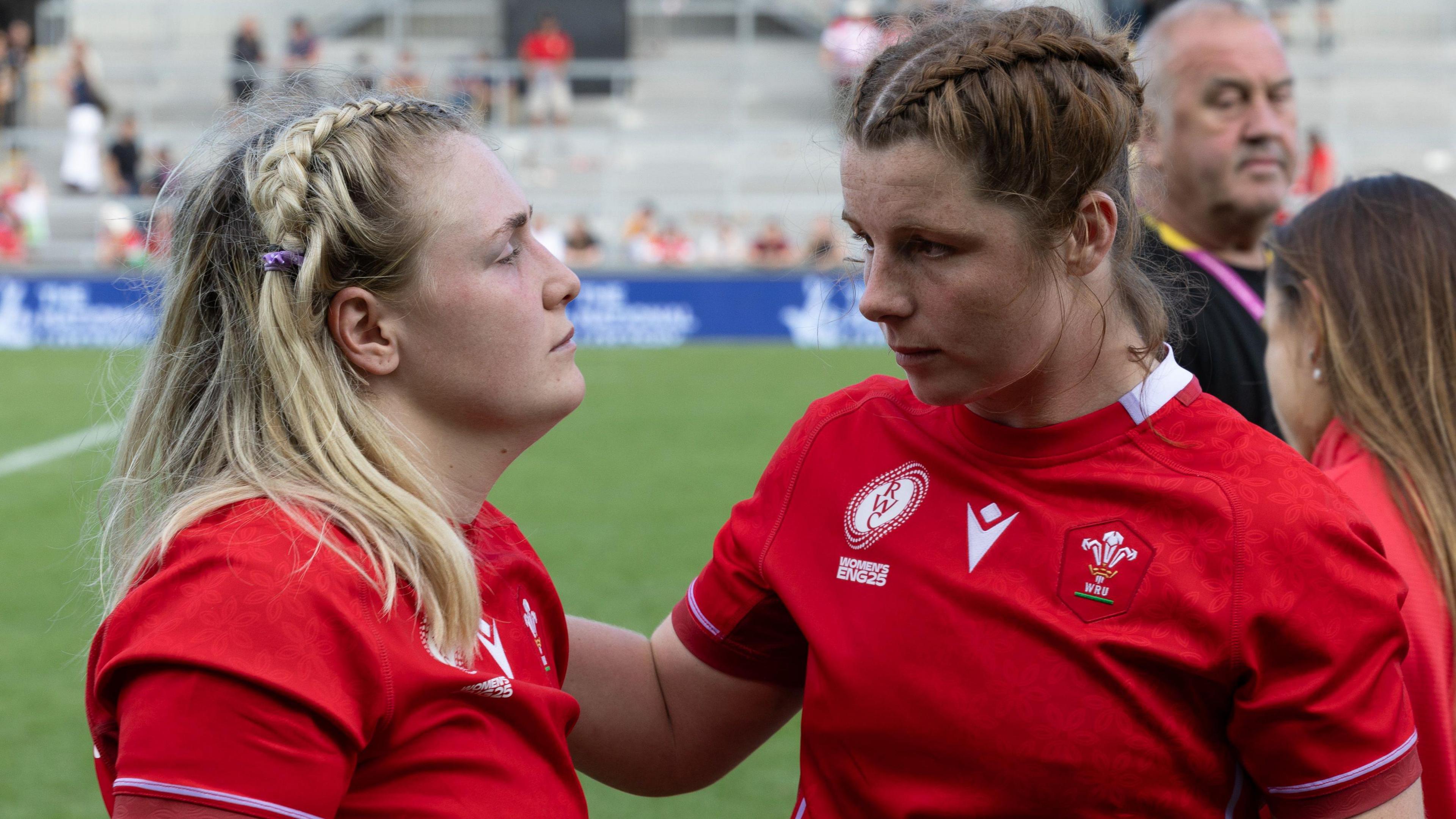
Wales co-captains Alex Callender and Kate Williams consoled each other in defeat
- Published
"You definitely can't say they have failed" was Belinda Moore's assessment of Wales' Rugby World Cup campaign.
But it's doubtful many would agree with the Welsh Rugby Union's (WRU) head of women's rugby, who was speaking before the Fiji defeat, when looking at the results and performances.
Previous defeats by Scotland and Canada left them winless and bottom of Pool B.
Wales had come into the campaign with a reasonable target of mirroring their last World Cup and booking a place in the quarter-finals, but they were alarmingly off the pace.
It put paid to any hopes of the women's side providing Welsh rugby with some much-needed relief from the current state of the game, instead it was more doom and gloom.
As players and coaches head home to lick their World Cup wounds, BBC Sport Wales takes a look at where it all went wrong for Sean Lynn's side.
Great expectations
Wales had endured a winless 2025 Six Nations, but it was almost a free pass for new head coach Lynn who had only come in the week before that tournament kicked off.
It was a chance to try out some combinations and blood new players, with the World Cup being his main focus.
Lynn said on the final Six Nations weekend that his squad lacked the skill and fitness to play his brand of rugby - the brand that won him three successive Premiership Women's Rugby titles with Gloucester-Hartpury.
Players were put through a punishing pre-season while the backroom staff was bolstered by Ben Flower to work on one of Wales' big weaknesses, the collision area.
Wales headed on their summer tour of Australia and all the hard graft appeared to pay off in the first Test, with Wales claiming a famous win over the Wallaroos in one of their best performances in recent years.
Australia returned the favour in the second Test, but overall the tour was seen as a success and Wales headed to the World Cup full of confidence, knowing they had it in them to claim big scalps.
The worst possible start
Wales have not 'failed' despite World Cup exit - Moore
Wales and Scotland knew their opening round match would define their tournament, this was their so-called World Cup final.
With Canada expected to top Pool B, it left only one other quarter-final qualification spot which Wales, Scotland and Fiji all had to battle for.
All the pre-match hype had been around Wales, the confidence in their camp spread through the media like wildfire and while everyone expected a close match, Wales were largely tipped to come out on top.
Scotland's preparations on the other hand were clouded by player contract uncertainty, while head coach Bryan Easson announced he would be leaving after the tournament.
Despite the disruption, the Scots went about their business quietly, knowing they had been building nicely. What transpired on the pitch few could have predicted, Scotland absolutely blew away their Celtic rivals in a record six-try victory.
The most alarming thing in defeat for Wales was that they were completely without fight. Was it the occasion? Was it the pressure? Only the players themselves know.
Lynn looked as baffled as anyone and certainly did not hold back in his post-match assessment, saying Wales were "bullied off the park".
It was a stinging defeat that Wales never looked to have recovered from and their tournament was as good as over just 80 minutes after it had begun.
Slight improvement
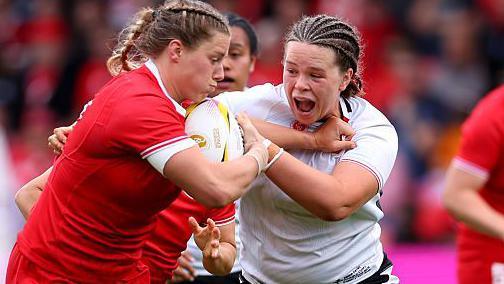
Canada lock Sophie de Goede gave a player of the match display against Wales
With bodies and egos bruised and battered, Wales faced the unenviable task of taking on the world's second best team, knowing they needed victory against Canada to keep their World Cup dream alive.
Lynn made some bold selections, heads certainly rolled as he backed up his mantra of "if you don't perform, you're out."
Youngsters like Maisie Davies, Molly Reardon, Bryonie King and debutant Branwen Metcalfe were thrown straight into the deep end, while experienced players watched on from the bench.
Wales were not given much of a chance against a team fancied to challenge tournament favourites England for the title, but after a promising 20 minutes there was some hope that a shock could be on the cards.
But it was a story of Wales' campaign as they failed to convert pressure into points, whereas Canada produced a six-try masterclass.
Wales' physicality was improved, with Lynn proud of the fight, but the attack lacked imagination, the usually trusted set-piece wobbled, with the nil scoreline the most telling factor.
Wales' tournament exit was confirmed when Scotland beat Fiji, making them the first team to bow out.
Lynn was 'impressed' with Wales' performance despite their loss to Canada
Frantic finale
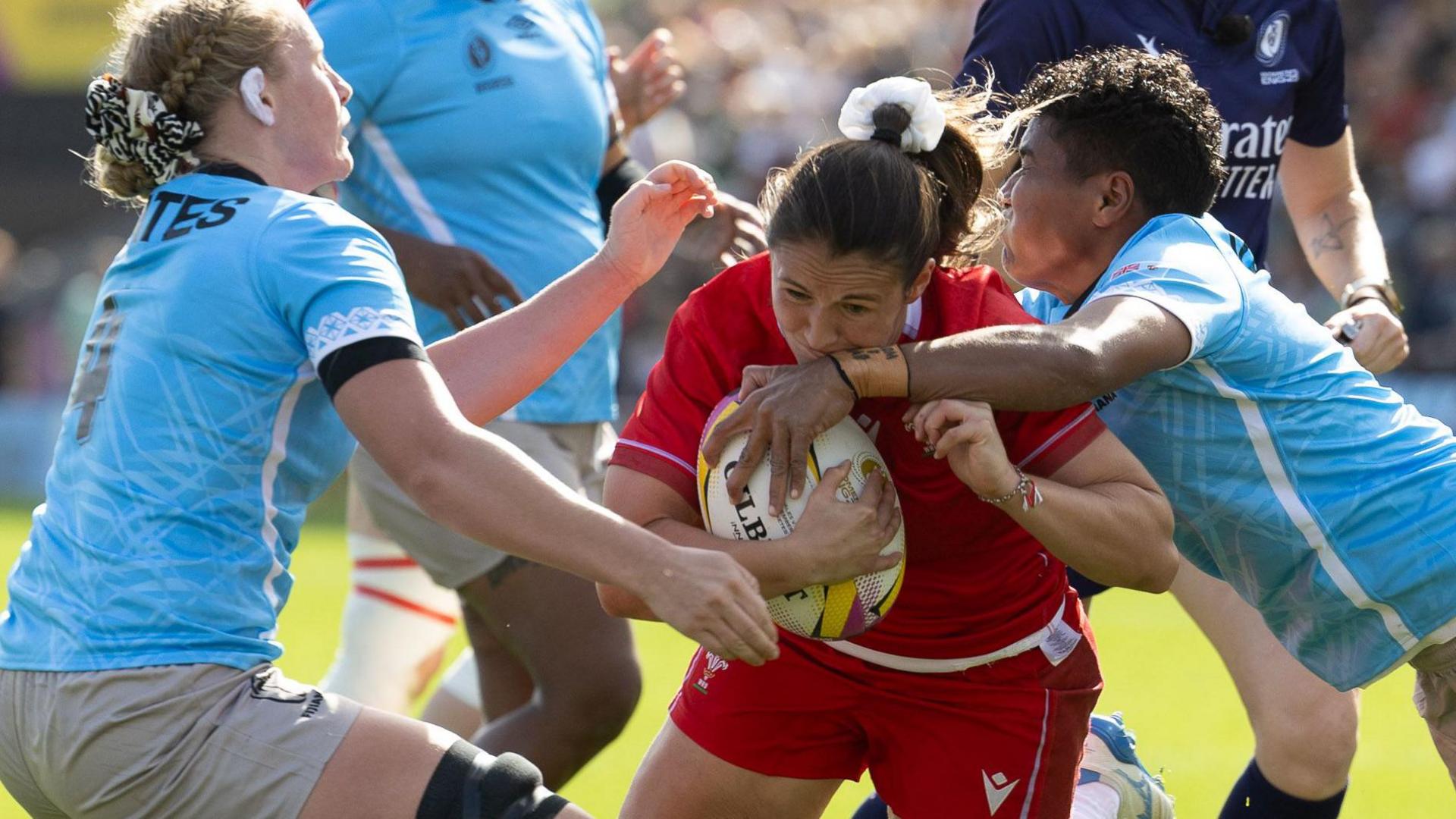
Fiji put in a brilliant defensive display to keep Wales out in the dying minutes
Wales and Fiji was supposed to be a dead rubber between two sides with nothing to play for but pride, but the nine-try spectacle at Sandy Park was anything but.
There was complete disparity between the two teams in terms of investment and experience, with Fiji having only played 45 Tests, while many of Wales' professional ranks had reached that milestone all by themselves.
But watching Fiji's attacking prowess, their defensive determination and their heart, they were far from a developing nation, they were announcing themselves as a contender on the world stage.
Wales were improved in areas, Kayleigh Powell and Carys Cox providing some much needed spark in attack, but it was the same old story of failing to get over the line.
They spent the final 10 minutes camped in Fiji's half, but fluffed chance after chance to score the winning try, while Fiji's defence was heroic.
Both camps had played down Ioan Cunningham returning to take on his former side and few were celebrating harder than him come the final whistle.
Wales once again ended the game in tears, with "gutted" one of the few words an emotional Alex Callender could muster in her post-match interview.
'We had opportunities and we didn't take those' - Lynn
Time to reflect
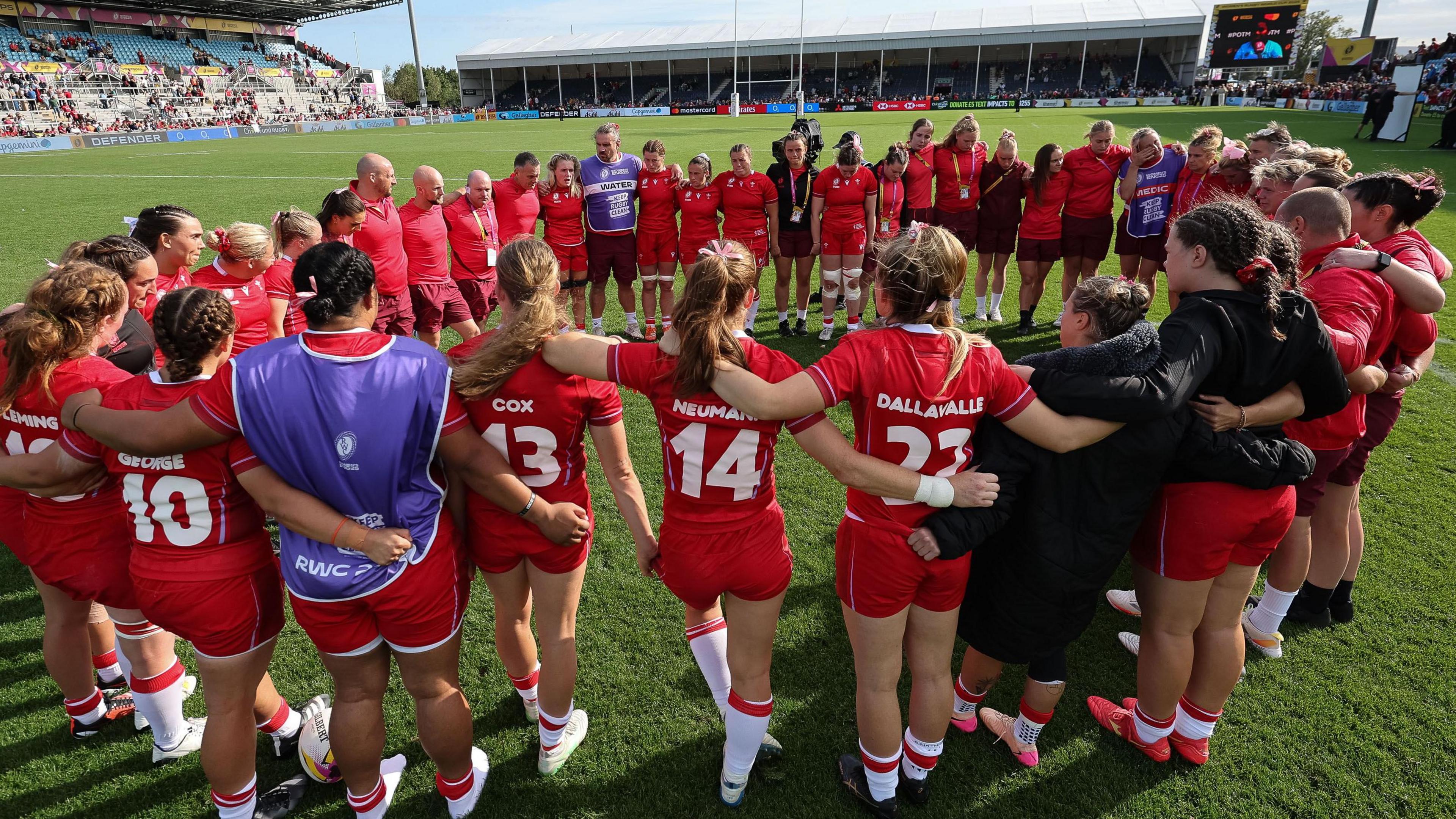
Wales have lost six World Cup matches in a row, their longest winless run in the tournament
So that was the story of Wales' World Cup, three games and three defeats.
After an appalling start, there were improvements as the weeks progressed, but Wales were still desperately left wanting and are now staring down the barrel of an all-time low world ranking of 12th.
But some people ask, why have Wales been so poor?
As a team they have the fourth-highest investment in women's international rugby with almost 40 full-time professional players, they train at world class facilities, they have doctors, nutritionists and sport psychologists at their disposal.
Lynn himself is a proven winner and while it may not have showed, Wales do have some world class players in their ranks.
But delve a little deeper and you start to see the bigger picture.
While most of the squad ply their trade in England's Premiership Women's Rugby (PWR), few are getting regular game time, which leads to questions over match fitness and sharpness. You can run broncos in the barn all day long, but only minutes truly prepare the players for Test rugby.
Out of the players that do feature, none are captains, none are leaders and that translates into Wales' game.
With the young co-captains in the pack, who is calling the shots in the backline? Lleucu George is a talent, but has a distinctive lack of voice for a fly-half, the same for those around her.
This is something Lynn said he is looking to address and will be building relationships with PWR clubs to ensure his players are getting opportunities.
Two professional women's sides, as proposed in the WRU's current consultation, and Wales' age grade teams will also play a vital role in getting players ready for international rugby.
Women pro teams in Wales 'symbolise positivity'
- Published25 August
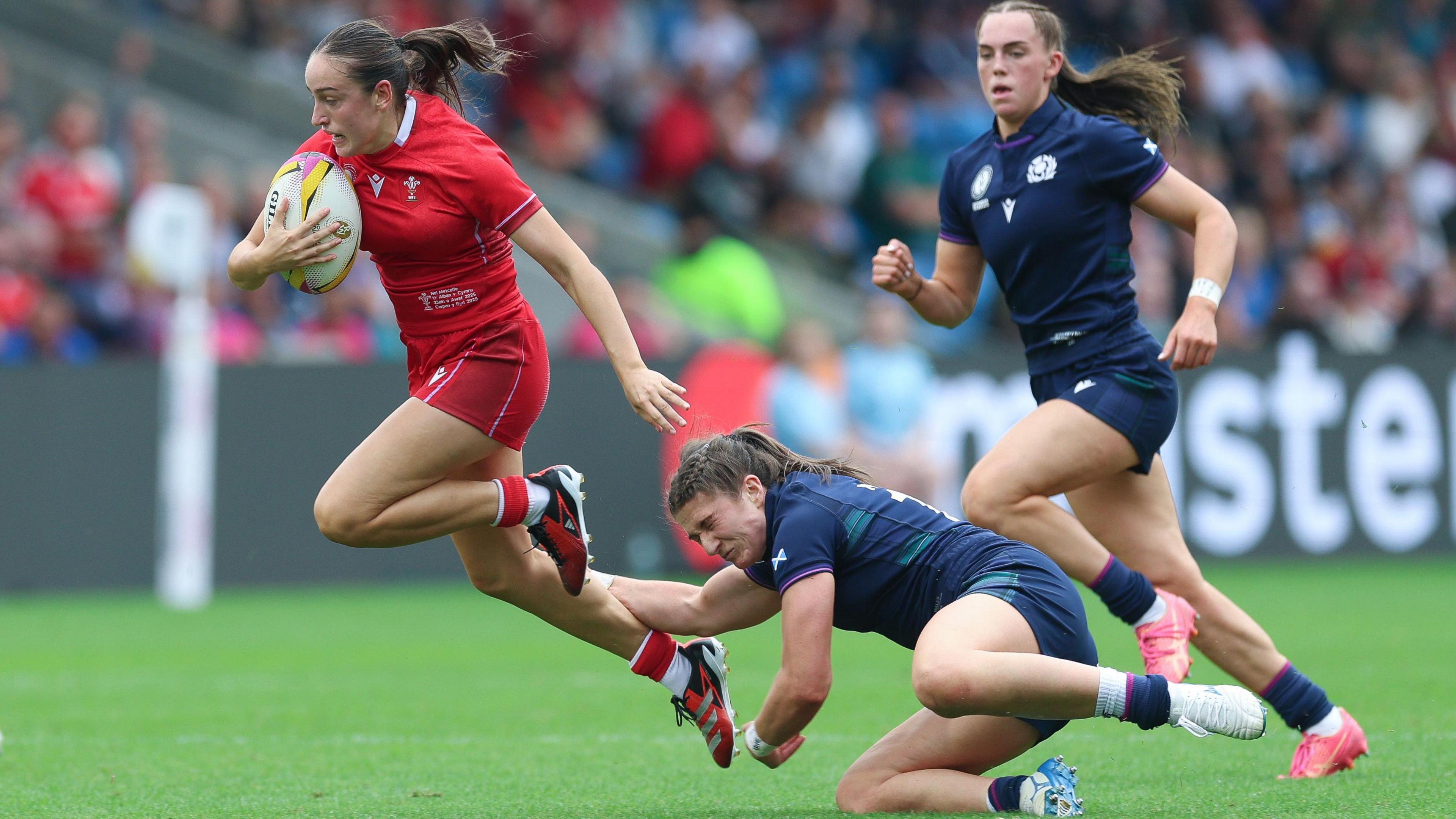
Nel Metcalfe started all three of Wales' World Cup matches
Winless Wales are 'in a better place' - Lynn
- Published6 September
The players must take a hard look at themselves, ultimately they are the ones who have to produce on the pitch.
Could they be suffering from contract complacency?
It was not too long ago when many had to juggle full-time work, families and long distance travel just for the honour of playing for their country.
And when it came time to get on the pitch, they had to make their sacrifices count.
But with the game now professional, has the motivation wavered? Is it just a job where you get paid no matter what?
I am sure the players would firmly disagree with that, but few will have got on the bus home on Sunday feeling they did themselves justice.
You just had to look at Fiji to see what Wales are desperately lacking.
Who are Wales' big ball carriers? Who has the ability to break the line? Who are the dominant tacklers?
Powell, while far from the finished product, showed that she will be a key player in freshening up Wales' stale attack, while Nel Metcalfe was easily Wales' standout player. The full-back/wing played with a maturity beyond her 20 years and is only going to get better and better.
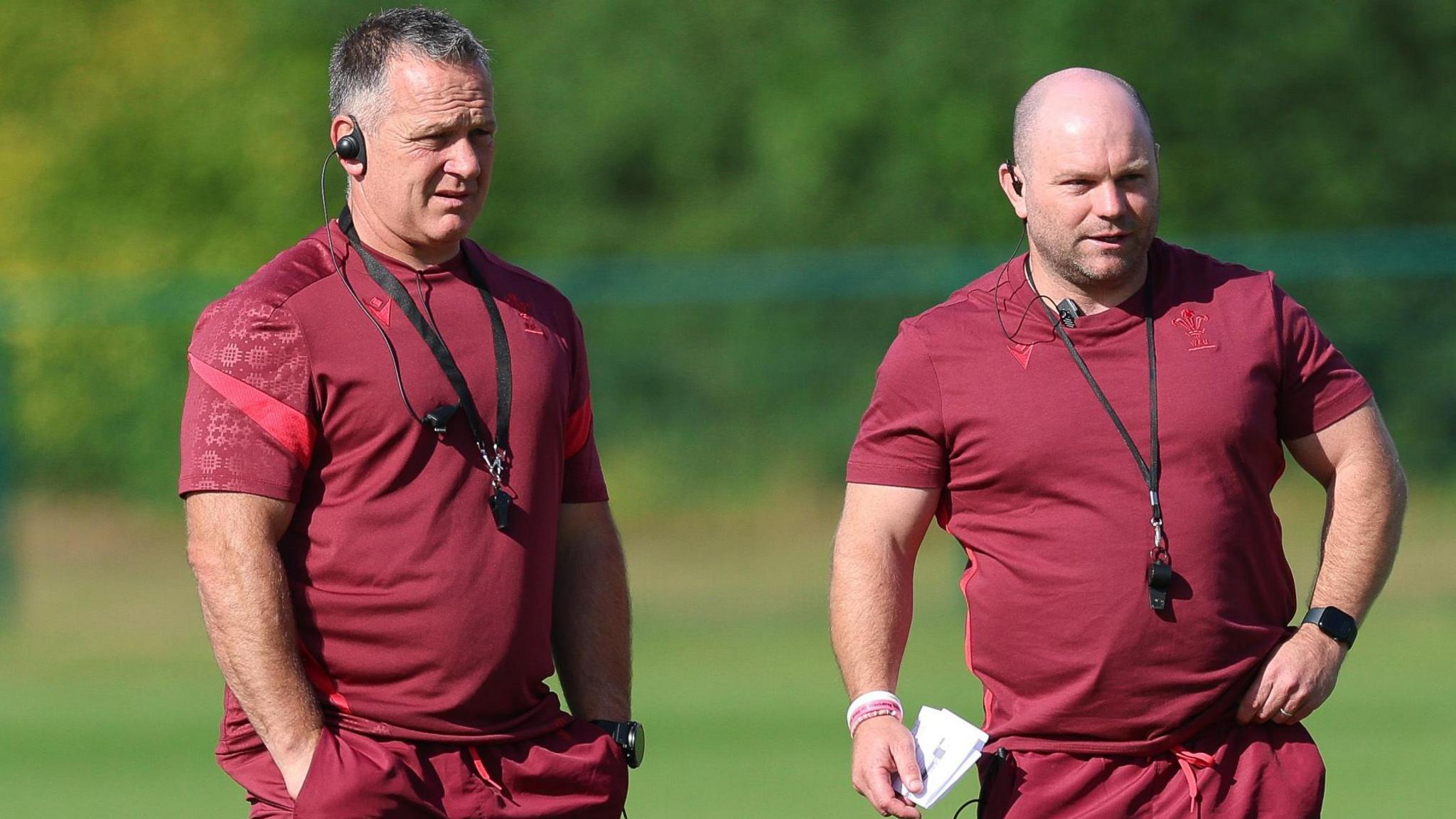
Shaun Connor and Sean Lynn were both half-backs in their playing days
The coaches also face questions.
Lynn chopped and changed his side throughout the tournament as Wales struggled for any sort of consistency, in stark contrast to teams like Scotland who largely fielded the same XV.
He admitted he thought he had put his best team out against Scotland, and when they did not deliver, there was no second chance for some.
Wales used to pride themselves on their defence, but since Dan Murphy came in as a temporary defence coach, they seem to be struggling to adjust to new systems and conceded 16 tries in just three games, with missed tackles and poor discipline a common theme.
Ben Flower was brought in to strengthen the collision area, but far too often Wales were bullied at the breakdown, while they had one of the tournament's slowest attacking ruck speeds.
Wales' attack also needs to be freshened up by Shaun Connor, the backline has long come in for criticism for its lack of inventiveness and ultimately lack of tries. Gone are the days when they can just rely on George's boot, they need to be less predictable because opposing teams are catching on fast.
There is so much to unpack in the unenviable post-mortem the lies ahead, but as Lynn said he is a proud Welshman and they will "all stand together" through these "tough times"."
They have six months until the start of the Women's Six Nations, when hopefully the future of Welsh rugby will be clearer, and when Wales can finally find a winning formula.
We wait in hope.